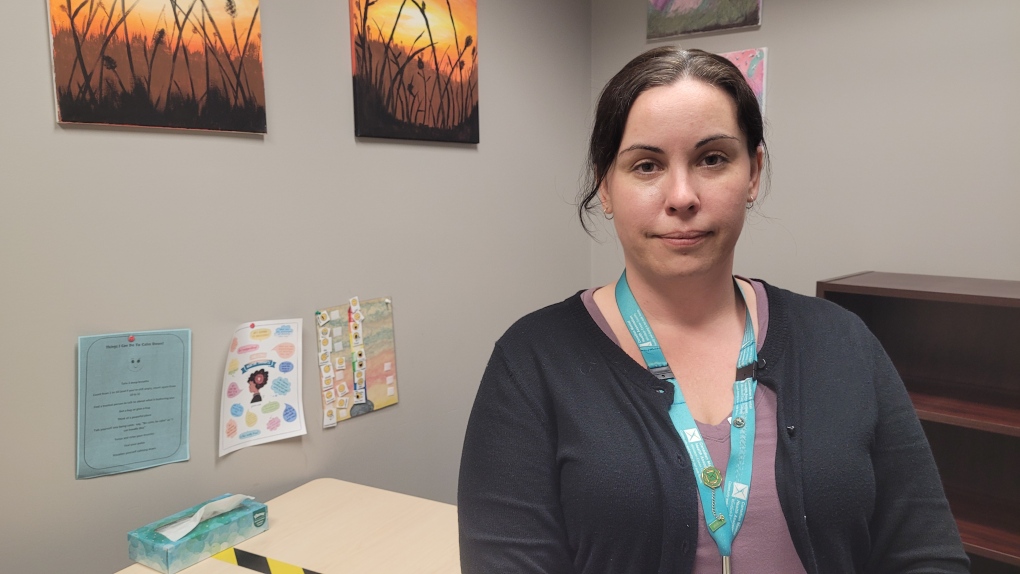After a major tragedy, should parents wait for their children to express their feelings before talking about it?
Not having an answer to all of your child's questions about tragedies like the Texas school shooting is perfectly okay, according to a grief therapist with the Canadian Mental Health Association.
But Dana St. Jean adds that opening up the conversation — and knowing when to do so — begins with understanding your child's cognitive development.
"Young children versus adolescents are going to ask different questions and have a different understanding of what happened," she said.
The conversations that can occur in the wake of an extreme tragedy can be some of the most difficult for a parent to have with their child.
These conversations have started up yet again, after an 18-year-old gunman in the small Texas town of Uvalde opened fire in an elementary school classroom, killing at least 19 children and two teachers.
According to St. Jean, parents may not know whether they should be the ones to start a conversation about the tragedy or wait instead for their children to bring it up first.
But the therapist with the Canadian Mental Health Association's Windsor-Essex branch said parents should let younger children raise the topic — but there can be more openness for older children.
"With pre-teens and adolescents, we can be very specific in asking, 'Did you hear what happened? Did anybody at school talk about the shooting in Texas?' We can ask these questions at the dinner table," St. Jean said.
 Dana St. Jean, a grief therapist with the Canadian Mental Health Association in Windsor-Essex, Ont. is pictured here on Wednesday, May 25, 2022. (Sanjay Maru/CTV News Windsor)
Dana St. Jean, a grief therapist with the Canadian Mental Health Association in Windsor-Essex, Ont. is pictured here on Wednesday, May 25, 2022. (Sanjay Maru/CTV News Windsor)
"With younger children, we want to give them the time and space to ask the questions."
But just having the conversation is not enough, she said. Parents should also stress the importance of sharing their feelings, while also understanding that it's okay not to have all the answers to their questions.
"We want to just be truthful and share the facts [about what we know happened],” St. Jean said. “It's okay to tell children, 'I don't know the answer to that question.' If kids are asking why this happened, you can say you don't know.”
"For any age, we want to ask kids, 'What do your teachers and your principals do to keep you safe at school?' So if we're talking about active shooter drills, fire drills, tornado drills, we want to have kids tell us that because that's going to help with that sense of safety."
Parents should also extend their conversations about coping with tragic events like the Texas shooting not just to their children — but also between one another.
With parents having their own share of fears and worries, St. Jean said, "adult conversations" risk being overheard by children who may be in a nearby room and cannot handle the emotional gravity of the language used.
That risk also extends to news coverage that parents could be watching.
"If we're watching TV, are the children in their rooms listening to it? Because what kids will do when they're hearing this information, we're thinking we're being really careful but actually, the child is trying to connect what's happening,” St. Jean said.
Instead, we always want to remind the kids that we can always have these kinds of conversations…The biggest thing is we want to be validating their feelings if they're scared or worried."
CTVNews.ca Top Stories

Chants of 'shame on you' greet guests arriving for the annual White House correspondents' dinner
An election-year roast of U.S. President Joe Biden before journalists, celebrities and politicians at the annual White House correspondents' dinner Saturday.
What is a 'halal mortgage'? Does it make housing more accessible?
The 2024 federal budget announced on April 16 included plans to introduce “halal mortgages” as a way to increase access to home ownership.
Here's where Canadians are living abroad: report
A recent report sheds light on Canadians living abroad--estimated at around four million people in 2016—and the public policies that impact them.
Deadly six-vehicle crash on Highway 400 sparked by road rage incident
One person was killed in a six-vehicle crash on Highway 400 in Innisfil Friday evening.
Opinion I just don't get Taylor Swift
It's one thing to say you like Taylor Swift and her music, but don't blame CNN's AJ Willingham's when she says she just 'doesn't get' the global phenomenon.
Invasive and toxic hammerhead worms make themselves at home in Ontario
Ontario is now home to an invasive and toxic worm species that can grow up to three feet long and can be dangerous to small animals and pets.
Harvey Weinstein hospitalized after return to New York from upstate prison
Harvey Weinstein’s lawyer said Saturday that the onetime movie mogul has been hospitalized for a battery of tests after his return to New York City following an appeals court ruling nullifying his 2020 rape conviction.
'We are declaring our readiness': No decision made yet as Poland declares it's ready to host nuclear weapons
Polish President Andrzej Duda says while no decision has been made around whether Poland will host nuclear weapons as part of an expansion of the NATO alliance’s nuclear sharing program, his country is willing and prepared to do so.
Central Alberta queer groups react to request from Red Deer-South to reinstate Jennifer Johnson to UCP caucus
A number of LGBQT+2s groups in Central Alberta are pushing back against a request from the Red Deer South UCP constituency to reinstate MLA Jennifer Johnson into the UCP caucus.

































